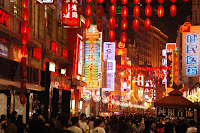TOKYO, Japan – Millions of Asians turned their eyes skyward Wednesday as dawn suddenly turned to darkness across the continent in the longest total solar eclipse this century will see. Millions of others, seeing the rare event as a bad omen, shuttered themselves indoors.
Chinese launched fireworks and danced in Shanghai. On a remote Japanese island, bewildered cattle went to their feeding troughs thinking night had fallen. And in India, a woman was crushed as thousands of viewers crowded the banks of the Ganges for a glimpse.
Starting off in India just after dawn, the eclipse was visible across a wide swath of Asia before moving over southern Japan and then off into the Pacific Ocean. In some parts of Asia, it lasted as long as 6 minutes and 39 seconds.
The eclipse is the longest since July 11, 1991, when a total eclipse lasting 6 minutes, 53 seconds was visible from Hawaii to South America. There will not be a longer eclipse than Wednesday's until 2132.
The celestial event was met by a mixture of awe, excitement and fear.
Cloudy skies and rain damped the show in many areas, but villagers in the town of Varanasi, on the banks of the Ganges in India, got one of the best views.
Thousands of Hindus took to the waters to cleanse their sins. The eclipse was seen there for 3 minutes and 48 seconds.
The gathering was marred when a 65-year-old woman was killed and six people injured in a stampede at one of the river's banks where about 2,500 people had gathered, said police spokesman Surendra Srivastava. He said it is not clear how the stampede started.
Others in India, though, were gripped by fear and refused to come outdoors. In Hindu mythology, an eclipse is caused when a dragon-demon swallows the sun, while another myth is that sun rays during an eclipse can harm unborn children.
"My mother and aunts have called and told me stay in a darkened room with the curtains closed, lie in bed and chant prayers," Krati Jain, 24, who is expecting her first child, said in New Delhi.
Clouds obscured the sun when the eclipse began. But they parted in several Indian cities minutes before the total eclipse took place at 6:24 a.m. (0054 GMT; 8:54 p.m. EDT).
On the tiny Japanese island of Akuseki, where the total eclipse lasted 6 minutes and 25 seconds, more than 200 tourists had to take shelter inside a school gymnasium due to a tornado warning.
But when the sky started to darken, everyone rushed out to the schoolyard, cheering and applauding, said island official Seiichiro Fukumitsu.
"The sky turned dark like in the dead of the night. The air turned cooler and cicadas stopped singing. Everything was so exciting and moving," Fukumitsu said.
Some villagers reported that their cows gathered at a feeding station, apparently mistaking the eclipse as a signal that it was dinner time, he said.
"It was rather mysterious," he said. "It must have been a frightening experience for people hundreds of years ago."
Jubilant eclipse watchers in China set off fireworks near the banks of the Qiantang River in coastal Zheijiang province as skies darkened overhead for about six minutes. Visitors from countries including Britain, Germany and Australia joined curious Chinese onlookers. Heavy clouds blocked the full eclipse but watchers saw a partial one.
The river bank in Yanguan village drew an exceptional number of watchers because it was also the site of the world's largest tidal bore, a phenomenon triggered by the eclipse where a giant tidal wave runs against the river's currents.
In Beijing, a thick blanket of grayish smog blotted out the sky.
In coastal Shanghai, eclipse watchers were disappointed by a light drizzle in the morning. As the sky darkened fully for about five minutes, however, watchers became excited.
Holding a big green umbrella and wearing special glasses, Song Chunyun was prepared to celebrate the occasion in a new white dress.
"Although the rain came, I don't want to screw up the mood. I want to enjoy the special day," she said before dancing and singing in the rain with her two sisters.
At a Buddhist temple in the Thai capital Bangkok, dozens of monks led a mass prayer at a Buddhist temple to ward off evil.
"The eclipse is bad omen for the country," said Pinyo Pongjaroen, a prominent astrologer. "We are praying to boost the fortune of the country."
In Myanmar, Buddhists went to Yangon's famed Shwedagon pagoda to offer flowers, fruits and water to ward off misfortune. Some warned their friends and family not to sleep through the eclipse for fear of getting bad luck.
"We all got up early this morning and prayed at home because our abbot told us that the solar eclipse is a bad omen," said a 43-year old school teacher Aye Aye Thein.
Bangladeshis also came out in droves.
"It's a rare moment, I never thought I would see this in my life," said Abdullah Sayeed, a college student who traveled to Panchagarh town from the capital, Dhaka.
He said cars in the town needed to use headlights as "night darkness has fallen suddenly." People hugged each other and some blew whistles when the eclipse began.
Total eclipses are caused when the moon moves directly between the sun and the earth, covering it completely to cast a shadow on earth.
By ERIC TALMADGE, Associated Press Writer






